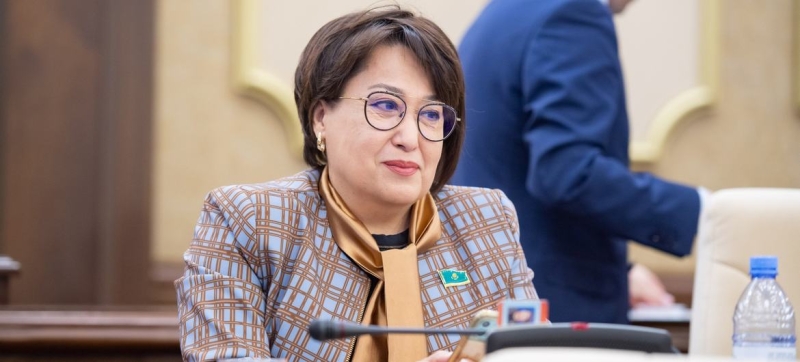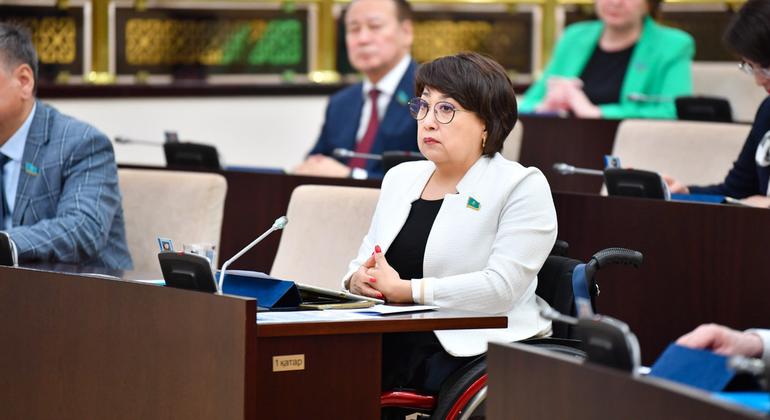
Senator Lyazzat Kaltaeva is one of several lawmakers with disabilities in Kazakhstan. Senator from Kazakhstan: feeling of pity for disabled people is replaced by respect Women
Senator Lyazzat Kaltaeva is one of several lawmakers with disabilities in Kazakhstan. She works to protect the rights of people with disabilities, including defending the reproductive rights of women with disabilities. In an interview with Kulpash Konyrova, she talked about how she took an active public position and how she came into politics.
Kulpash Konyrova: Looking at your track record, I am surprised how much you have managed to do: graduate from several universities, create an Association for Women with Disabilities, implement the “School of Independence” project, receive the UNESCAP Award as a fighter for the rights of people with disabilities, become a deputy of the Maslikhat, and subsequently the Senate. How is this possible, considering that you use a wheelchair?
LK: I guess I was just lucky with my family, where not only me, but also my two older sisters, my father always set the bar high: “You can do anything.” ! You can do anything!”
When I was five years old, my mother died. The father was left alone with three still small daughters. At the age of seven, just before school, we all had an accident. I suffered the most. A spinal fracture confined me to a wheelchair forever.
At the age of seven, just before school, we all got into an accident. I suffered the most. A broken spine confined me to a wheelchair forever
My father and two older sisters did everything so that I did not feel disadvantaged, on the contrary, they taught me to be the best in my studies. As a result, I graduated from school with honors, then the All-Union Institute of Arts, specializing in graphics and painting, and the Kazakh Pedagogical Institute named after Abay. But all this in absentia, without leaving home. At the same time, from the age of 16, I earned money by translating from English. It seemed that work and my whole future life would go along the same beaten track within four walls.
But I had a desire to achieve something more, to discover for myself the world that was out there, “outside the window,” and I no longer wanted to learn about it from my sisters, I wanted to push the boundaries that held me back. & ;nbsp;
And the moment came that prompted me to make a decision and tell my family that I wanted to live separately. I fell in love. I have a young man.
My father supported me, but warned me: in order to become completely independent, I need to earn enough myself. And this encouraged me to go get another education and become a securities specialist. Subsequently, I was also able to obtain a law degree. The work was profitable, and I felt confident.
KK: In that case, why did you decide to become a social activist who deals with the problems of people with disabilities?
LK: I realized that I was very lucky with my family. I knew many of my peers – young girls and boys with disabilities who sat at home, and whose life was reduced to talking about their illness and medications. Then I decided to help them and created with my like-minded friend the Association of Women with Disabilities “Shyrak”, which in Kazakh means “Source of Light”.
KK: Why only for women?
LK: When we discussed our women’s problems, we often heard snickers addressed to us, saying that all this was not serious. However, it is not. For example, men with disabilities were more willingly hired than women with disabilities. Even women who stay at home always have more difficulties. For example, if she became a kelin (daughter-in-law), then, according to our traditions, she must take care not only of her husband and children, but also his parents, and clean the house. Even the question of how to become a mother was no less important for many of us.
A person with a disability is not some kind of asexual being. That’s why I relied on the gender aspect
In childhood, girls and boys may have different interests. It’s the same in adolescence. This approach is taken into account in many countries of the world: a person with a disability is not some kind of asexual being. That’s why I relied on the gender aspect.
KK : You were able to promote your Association so that your work experience was studied not only in Almaty, but also in other cities of Kazakhstan and even in neighboring republics. What is your success based on?
LK: In many ways, all those UN units that worked in Kazakhstan helped me and my team: UNDP, UNICEF. We were provided with advisory and moral support. I got the opportunity to study the experience of other countries, which I then applied in my work.
For example, in the Association we followed the path of our Finnish colleagues and immediately abandoned charity. We focused on getting society to talk about our problems and that these are not private issues, but something that concerns a large part of society, whose interests cannot be ignored by the authorities.

A little later, with her team, she organized the project “School of Independent Living for Persons with Disabilities,” which has continued to operate successfully for the third year not only in Almaty, but also in other cities of the republic. The goal of this project is to take young people with disabilities to a different level for them so that they can become self-sufficient and independent to the best of their ability.
As a rule, people with disabilities mostly stay at home and care for them lies with relatives. Therefore, as part of our school, we take people to a country camp for seven days, where we teach them what household or care functions they can perform themselves. Then we put them up in a separate apartment for three days, give them money for groceries so that they can practice on their own: without the help of their relatives, go to a nearby store, buy groceries, cook their own food.
KK: But you did not stop at work in an NGO, which was satisfying and useful, and went further, deciding to go into politics and run for parliament.
LK: As I said above, my social life was closely intertwined with the activities of various UN structures accredited in Kazakhstan. I was able to expand not only the boundaries of my home and my country, but also got the opportunity to see the world and compare how people with disabilities live in other countries.
Once, on one of my trips abroad, I saw an interesting animation: around the table at which important decisions are made, there are not only chairs, but also a wheelchair. This visual propaganda amazed me and became the impetus that led me to the idea of going further – into politics, and already at the legislative level to achieve better life for people with disabilities.
As for my social activities, I later received the UN ESCAP “Fighter for the Rights of Persons with Disabilities” award, and spoke at the UN General Assembly three times. The main thing that cooperation with the UN gave me was an understanding of the nature of human rights, that I am a citizen like all ordinary citizens, and have the right to realize myself.
KK: How difficult is it for a person with a disability to become a deputy?
LK:I admit, it was not easy. I remember in 2012, when I decided to run for the Mazhilis (lower house of parliament – editor’s note), they made me understand: don’t even try. But I’m not easily intimidated. And I still made an attempt to become a deputy, but first of the Maslikhat (a local representative body operating at the regional level – editor’s note). However, despite my team’s best efforts during the election campaign, I lost.
I remember in 2012, when I decided to run for the Majilis, they made me understand: don’t even try. But I’m not easily intimidated
I don’t know if administrative resources were partly to blame for this , but after analyzing the mistakes, I again decided to take this barrier in my life and in 2016 I was elected as a deputy of the Maslikhat of the Turksib district of Almaty.
Perhaps my active public life was appreciated by the country’s leadership; in 2022, by presidential decree, I became a deputy of the Senate, which was very pleasant, but at the same time unexpected news for me.
KK: You have been a senator for two years now. What exactly were you able to do during this time?
LK: The law on a 30 percent quota for women, young people and people with disabilities in parliament came into effect in 2023. This is a big step forward for Kazakhstan that people with disabilities have actually entered the legislative and representative branches of government. Today there are seven people with disabilities in the Mazhilis, and in the Maslikhats there are 71 people.
Now I am developing the topic of accessibility of sports and tourism for people with disabilities, so that our Kazakh society can overcome the still existing stereotype that people with disabilities can only appear in hospitals and social security agencies. They are citizens just like everyone else and should be everywhere.
Important to me remove existing barriers. At the same time, I am glad that people’s attitudes towards people with disabilities are changing. The feeling of pity is replaced by some kind of respect. Women with disabilities give birth to children and realize themselves as artists, writers, and do business.
Over time During my work in the Senate, two bills were adopted that affected different areas of the lives of people with disabilities. A social code was adopted, which I followed from start to finish.
In addition, Kazakhstan ratified Optional Protocol to the Convention on the Rights of Persons with Disabilities. This means that if our disabled citizen is not satisfied with the court’s decision, he has the right to write a complaint against Geneva to the International Court of Justice.
That is, our Kazakh society has already moved from understanding the social protection of people with disabilities to recognizing the human rights of people with disabilities. A disabled person is not just a person receiving benefits, but a citizen who has his own constitutional rights that must be realized. I will continue to work on this.
